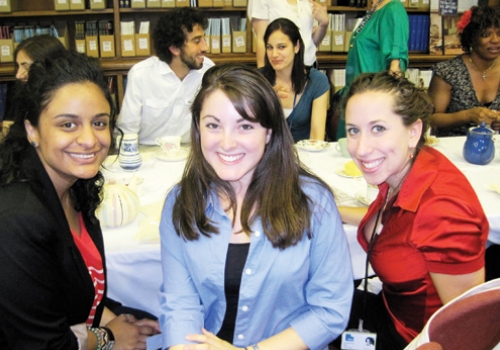Home >> News >> 2011 >> Aug >> Health News - Institute hosts tea party and dance to mark discovery of link between malaria and mosquitoes
Health News - Institute hosts tea party and dance to mark discovery of link between malaria and mosquitoes

Published: 25 August, 2011
by PAVAN AMARA
Tea, two-steps and tropical diseases
IT is not often that mosquitoes have a tea party and dance held in their honour.
But on Friday, staff at the London School of Hygiene and Tropical Medicine pulled out all the stops for World Mosquito Day.
Around 150 health experts and people from malaria charities attended the 1930s-theme event in the Ross Institute, Bloomsbury, on Friday.
It was a celebration marking the day Dr Ronald Ross discovered a crucial connection between mosquito bites and malaria.
Clinical scientist and malaria expert Dr Colin Sutherland said: “Malaria was known as a disease for centuries, and everyone thought it was associated with breathing in bad air.
“Nobody knew exactly how you got it, but then Dr Ross discovered the presence of the malarial parasite within a specific species of mosquito.”
Dr Sutherland said researchers at the School had recently discovered that mosquitos have an acute sense of smell.
He said: “For people who suffer from blood disorders like sickle cell or beta thalassemia, they often have far fewer mosquito bites simply because the mosquito’s sensitive sense of smell tells them that person is not as nutritious for them.
“Those particular blood disorders mean that the red blood cells are formed differently, and they work in a different way. You may suffer tiredness more frequently, but a mosquito will leave you alone because you are not as succulent for them – and they know it, because they can smell you. You’re not worth the effort.”
He added: “That could contribute to the reason why some people are attacked by mossies endlessly, and others can walk around with relatively little protection and not get bitten once.”
Dr Sutherland also concluded that the recent research showed the smell mosquitoes were most attracted to was the smell of Limburger cheese, because it’s similar to the smell of sweaty human skin.
The Tony Blair Faith Foundation, raising funds to tackle malaria deaths in developing countries, also attended the malaria tea party.
Blair Foundation “Faith Act Fellow” Rachel Finn said: “Because malaria is such a huge problem globally we are spending a year-long fellowship learning all about it. We’ve been through the US, India and Canada, and this month we’re learning as much as we can in London. It’s good to see so many experts together in the same room, and we’ve been talking about malaria prevention strategies with representatives from other charities.”
Dr Ross’s 1902 Nobel Prize for Physiology or Medicine is on display in the reception of the building on Keppel Street.
The Ross Institute was incorporated into the London School of Hygiene and Tropical Medicine in 1934.




Comments
Post new comment